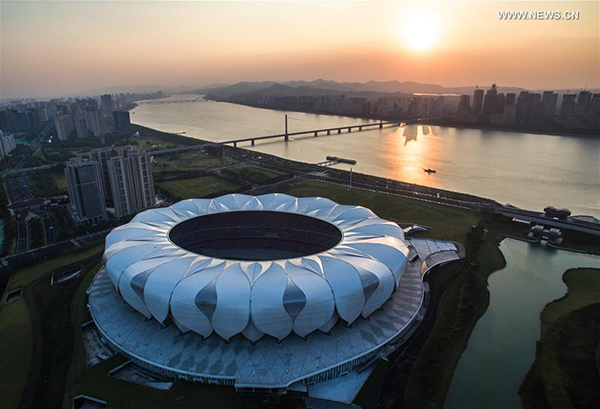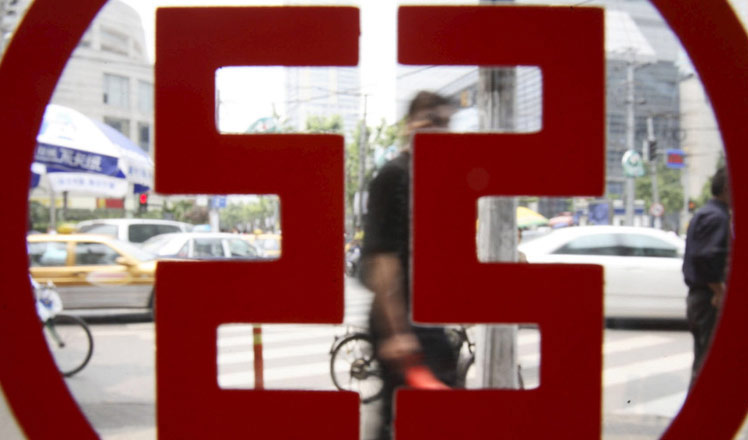No need for G20 to discuss overcapacity
Updated: 2016-08-29 07:40
By Yang Yanqing(China Daily)
|
||||||||
 |
|
Photo taken on Aug 25, 2016 shows the Hangzhou Olympic Sports Center in the Binjiang district of Hangzhou, capital of East China's Zhejiang province. Hangzhou is the host city for the upcoming G20 Summit.[Photo/Xinhua] |
Some developed countries want China's excess capacity to be put on top of the G20 summit agenda that starts in Hangzhou, Zhejiang province, in less than a week. Should the G20 summit focus on the issue?
People's Bank of China Governor Zhou Xiaochuan made a key point at the China Economists 50 Forum in February: Since China's overcapacity is a domestic issue, it should be resolved within the country, not at international conferences, in order to keep trade protectionist tendencies away.
We need to have a clear understanding of the correlation between overcapacity and international trade. People generally believe global trade is all about "absolute comparative advantage," as Adam Smith put it in his Wealth of Nations. But Zhou said:
"It does not conform to theories of classical economics, where, even without factoring in differences in resource endowments, a country may have higher capacity and therefore higher output of a certain product as a result of labor division; and, by the same token, other countries may have stronger production capacity and output of other products. This reflects clustering of production skills and equipment."
In other words, global trade is not possible without excess output capacity, as David Ricardo postulated in his theory of relative comparative advantage.
According to Zhou: "Structural issues and those involved in supply and demand of physical goods are actually rooted in price misalignments, and therefore product/industry related structural issues are all caused by pricing distortions."
How should we understand the relationship between structural layout and price in the context of overcapacity? From the micro perspective, no company will overproduce when prices are right. But from the global balancing perspective, however, without factoring in price distortions and unjustified subsidies, balanced market prices should never lead to continuous overcapacity. Serious overcapacity is ultimately attributable to structural problems, apart from the cyclical nature of economy and the temporary decline in demand because of a slowdown in growth.
- Searching for the way out of overcapacity woes
- China's overcapacity cut not to harm global growth: spokesperson
- Deepening market reforms will help reduce overcapacity
- China steel mills seek remedy for overcapacity
- Local govts need to speed up overcapacity reduction: NDRC
- Truck manufacturers face overcapacity
- SOE reform pivotal to cutting China's overcapacity
- Industrial overcapacity to be reduced in Chongqing
- G20 trade ministers agree to tackle global steel overcapacity
- Experts warn of overcapacity crisis in China's ports
- Bolivian deputy interior minister killed by miners: report
- In photos: Great Dorset Steam Fair 2016
- Historical towns before and after Italy's earthquake
- Car bomb kills at least eight at police headquarters in Turkey
- Brazil's Senate begins Rousseff's impeachment trial
- Arts festival aims to unite cultures

 World's top 10 largest banks by assets
World's top 10 largest banks by assets
 Sand sculptures to welcome the G20 Summit
Sand sculptures to welcome the G20 Summit
 Historical towns before and after Italy's earthquake
Historical towns before and after Italy's earthquake
 College prepares 300 sleeping mats for parents
College prepares 300 sleeping mats for parents
 Ten photos from around China: Aug 19 – 25
Ten photos from around China: Aug 19 – 25
 Top 5 fitness bands in customer satisfaction
Top 5 fitness bands in customer satisfaction
 Orangutan goes shopping in Southwest China
Orangutan goes shopping in Southwest China
 Prince William and Kate visit charity orgarnization
Prince William and Kate visit charity orgarnization
Most Viewed
Editor's Picks

|

|

|

|

|

|
Today's Top News
Trump outlines anti-terror plan, proposing extreme vetting for immigrants
Phelps puts spotlight on cupping
US launches airstrikes against IS targets in Libya's Sirte
Ministry slams US-Korean THAAD deployment
Two police officers shot at protest in Dallas
Abe's blame game reveals his policies failing to get results
Ending wildlife trafficking must be policy priority in Asia
Effects of supply-side reform take time to be seen
US Weekly

|

|







